

The subscription model for ebooks hasn’t emerged yet, but it will. From the beginning of Digital Change Thinking Time, which for me goes back to the mid-1990s, “subscription” has been high on the list of future expectations.
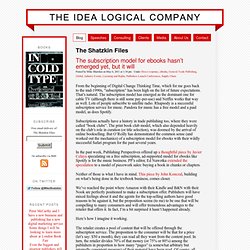
That’s natural. The subscription model has emerged as the dominant one for cable TV (although there is still some pay-per-use) and Netflix works that way as well. Lots of people subscribe to satellite radio. Rhapsody is a successful subscription service for music. Pandora for music has a free model and a paid model, as does Spotify. Subscriptions actually have a history in trade publishing too, where they were called “book clubs”. In the past week, Publishing Perspectives offered up a thoughtful piece by Javier Celaya speculating on a free subscription, ad-supported model for ebooks like Spotify is for the music business. Neither of those is what I have in mind. We’ve reached the point where Amazon with their Kindle and B&N with their Nook are perfectly positioned to make a subscription offer. Co-Creating Value with Customers.
By Scott Walker, President, Brain Candy, LLC Multimedia.
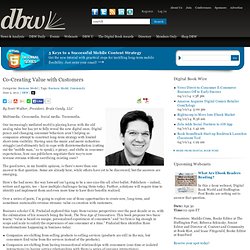
Crossmedia. Social media. Transmedia. Our increasingly mediated world is playing havoc with the old analog rules but has yet to fully reveal the new digital ones. The good news, in my humble opinion, is there’s more than one answer to that question. Here’s the bad news: the way forward isn’t going to be a one-size-fits-all silver bullet. Over a series of posts, I’m going to explore one of those opportunities to create new, long-term, and sometimes sustainable revenue streams: value co-creation with customers.
Business scholar C.K. Prahalad goes on to explain how companies should begin to build global networks of resources to support these kinds of customized value, but let’s focus just on these points. At the recent LA Games Conference, I heard the phrase “the game as service” more than a few times. However, emerging business models involve a network of parties, with no clear endpoint. Textbooks Go the iTunes Route, but Buying by Chapters May Not Save Students Money - Technology - The Chronicle of Higher Education. By Ben Wieder The high cost of textbooks is a rising student complaint. It inspired recent federal legislation calling on colleges to list the cost of required reading.
When courses use only a portion of expensive books, it only makes matters worse. "Sometimes a professor only assigns five chapters out of a whole book," says Jennie A. Dexter, who just graduated from Oklahoma State University at Tulsa with a degree in marketing and management. Now textbook publishers are offering an experimental form of price relief: The option to buy book chapters instead of the whole thing, in electronic versions with lower prices. Getting the Units Right = Sound Publishing Strategy. When textbooks go fully digital what will schools buy?
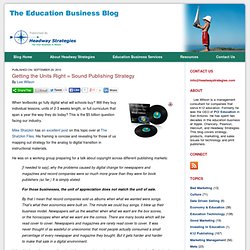
Will they buy individual lessons, units of 2-3 weeks length, or full curriculum that span a year the way they do today? This is the $5 billion question facing our industry. Mike Shatzkin has an excellent post on this topic over at The Shatzkin Files. His framing is concise and revealing for those of us mapping out strategy for the analog to digital transition in instructional materials. He was on a working group preparing for a talk about copyright across different publishing markets: [I needed to say]..why the problems caused by digital change for newspapers and magazines and record companies were so much more grave than they were for book publishers (so far.) The unit of appreciation and the unit of sale. My professional background — indeed, most of my life that isn’t family, friends, baseball, and politics — is trade publishing: the publishing that is intended for consumers and which got its name becaiuse it has been transacted primarily through “the trade”: bookstores.
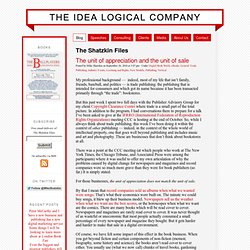
But this past week I spent two full days with the Publisher Advisory Group for my client Copyright Clearance Center where trade is a small part of the total picture. In addition to the program, I had conversations there to prepare for a talk I’ve been asked to give at the IFRRO (International Federation of Reproduction Rights Organizations) meeting CCC is hosting at the end of October. So, while I always think about trade publishing, this week I’ve been doing it within the context of other publishing — indeed, in the context of the whole world of intellectual property, one that goes well beyond publishing and includes music and art and photography. Back to the Future: The Changing Paradigm for College Textbooks and Libraries. eTextbooks | Viewpoint Back to the Future: The Changing Paradigm for College Textbooks and Libraries By Fred Stielow, Raymond Uzwyshyn05/25/11 The debate over electronic textbooks and ever-increasing costs for traditional textbooks continues to rage.
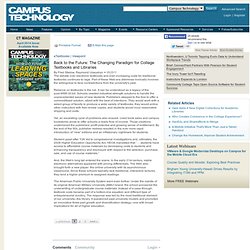
Part of these Web-era dilemmas ironically involves the willingness to face contradictions from the university's past. Reliance on textbooks is the rub. It can be understood as a legacy of the post-WWII GI bill. Yet, an escalating cycle of problems also ensued. Student upset after Y2K led to congressional investigations and, ultimately, the 2008 Higher Education Opportunity Act. And, the Web's long tail entered the scene. The American Public University System went even further.